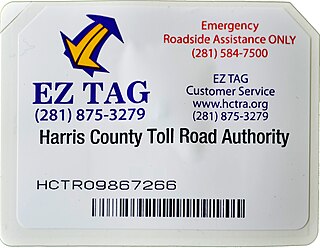
In telecommunications, a transponder is a device that, upon receiving a signal, emits a different signal in response. The term is a blend of transmitter and responder.
Radio-frequency identification (RFID) uses electromagnetic fields to automatically identify and track tags attached to objects. An RFID system consists of a tiny radio transponder called a tag, a radio receiver, and a transmitter. When triggered by an electromagnetic interrogation pulse from a nearby RFID reader device, the tag transmits digital data, usually an identifying inventory number, back to the reader. This number can be used to track inventory goods.

EZ TAG is an electronic toll collection system in Houston, Texas, United States, that allows motorists to pay tolls without stopping at toll booths. Motorists with the tags are allowed to use lanes reserved exclusively for them on all Harris County Toll Road Authority (HCTRA) roads. As of late 2003, the EZ TAG can also be used on all lanes of tolled roadways in Texas that accommodate electronic toll collection.
Automatic identification and data capture (AIDC) refers to the methods of automatically identifying objects, collecting data about them, and entering them directly into computer systems, without human involvement. Technologies typically considered as part of AIDC include QR codes, bar codes, radio frequency identification (RFID), biometrics, magnetic stripes, optical character recognition (OCR), smart cards, and voice recognition. AIDC is also commonly referred to as "Automatic Identification", "Auto-ID" and "Automatic Data Capture".

HID Global is an American manufacturer of secure identity products. The company is an independent subsidiary of Assa Abloy, a multinational door and access control conglomerate. Björn Lidefelt was appointed CEO on 27 January 2020. He succeeded Stefan Widing, who led HID Global for over four years.

A tracking system, also known as a locating system, is used for the observing of persons or objects on the move and supplying a timely ordered sequence of location data for further processing.

Intermec is a manufacturer and supplier of automated identification and data capture equipment, including barcode scanners, barcode printers, mobile computers, RFID systems, voice recognition systems, and life cycle services.

Transponder timing is a technique for measuring performance in sport events. A transponder working on a radio-frequency identification (RFID) basis is attached to the athlete and emits a unique code that is detected by radio receivers located at the strategic points in an event.
Smart Label, also called Smart Tag, is an extremely flat configured transponder under a conventional print-coded label, which includes chip, antenna and bonding wires as a so-called inlay. The labels, made of paper, fabric or plastics, are prepared as a paper roll with the inlays laminated between the rolled carrier and the label media for use in specially-designed printer units.
LDMOS is a planar double-diffused MOSFET used in amplifiers, including microwave power amplifiers, RF power amplifiers and audio power amplifiers. These transistors are often fabricated on p/p+ silicon epitaxial layers. The fabrication of LDMOS devices mostly involves various ion-implantation and subsequent annealing cycles. As an example, the drift region of this power MOSFET is fabricated using up to three ion implantation sequences in order to achieve the appropriate doping profile needed to withstand high electric fields.

Omni-ID is a vendor of passive UHF Radio-frequency identification (RFID) tags. Founded in 2007 as Omni-ID, Ltd., its products are a range of RFID tags designed to operate in all environments, including on metal and liquids.
Real-time locating systems (RTLS), also known as real-time tracking systems, are used to automatically identify and track the location of objects or people in real time, usually within a building or other contained area. Wireless RTLS tags are attached to objects or worn by people, and in most RTLS, fixed reference points receive wireless signals from tags to determine their location. Examples of real-time locating systems include tracking automobiles through an assembly line, locating pallets of merchandise in a warehouse, or finding medical equipment in a hospital.

Josef Preishuber-Pflügl is an Austrian technology leader.
RFID on metal are radio-frequency identification (RFID) tags which perform a specific function when attached to metal objects. The ROM tags overcome some of the problems traditional RFID tags suffer when near metal, such as detuning and reflecting of the RFID signal, which can cause poor tag read range, phantom reads, or no read signal at all.
CISC Semiconductor GmbH defines itself as “a design and consulting service company for industries developing embedded microelectronic systems with extremely short Time-To-Market cycles.” The company started in 1999, working in the semiconductor industry, but soon expanded its field towards the automotive branch and further extended business towards the radio frequency technology (RFID) sector in 2003. Since then, CISC gained significant experience and expertise in RFID, developing an own business segment and highly sensitive measurement equipment to test and verify RFID systems for different industries. Representatives of CISC Semiconductor are actively working on and contributing to worldwide standardization of future technologies like RFID, in different standardization organizations. This effort brings CISC into the position of being a leader in research and development, and thus being able to be “one step ahead of innovation”. As of 2011 CISC Semiconductor was in a globally leading standardization position for RFID testing by providing the convener of ISO/IEC JTC1 WG4/SG6 on “RFID performance and conformance test methods“, as well as GS1 EPCglobal co-chairs for performance and conformance tests.
Zetes Industries S.A. / N.V. is a Belgian technology company headquartered in Brussels with operations in Europe, Africa and the Middle East, employing more than 1 200 people in 22 countries.
B.O.S. Better Online Solutions Ltd. is a publicly traded company, headquartered in Israel, that provides RFID and supply chain solutions. Its shares are traded on the NASDAQ Capital Market.

EM Microelectronic, based in Marin, La Tène near Neuchâtel in Switzerland, is a developer and semiconductor manufacturer specialized in the design and production of ultra low power, low voltage integrated circuits for battery-operated and field-powered applications in consumer, automotive and industrial areas. It is a subsidiary of The Swatch Group.
Various schools have been using radio-frequency identification technology to record and monitor students.

Innovative Timing Systems (ITS) is a privately held company located in Saint Louis, Missouri which manufactures transponder timing equipment for sports. Its Jaguar system is a Gen 2.0 Radio Frequency Identification (RFID) system operating at ultra high frequencies. Over 500 Jaguar timers use the system to time running, bicycle, motocycle, paddleboard and triathlon events.







